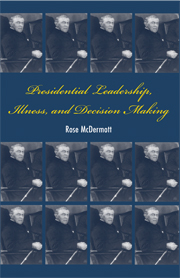Book contents
- Frontmatter
- Contents
- Acknowledgments
- 1 Introduction
- 2 Aging, Illness, and Addiction
- 3 The Exacerbation of Personality: Woodrow Wilson
- 4 Leading While Dying: Franklin Delano Roosevelt, 1943–1945
- 5 Addicted to Power: John F. Kennedy
- 6 Bordering on Sanity: Richard Nixon
- 7 The Twenty-fifth Amendment
- 8 Presidential Care
- Appendix: Foreign Leadership and Medical Intelligence: The Shah of Iran and the Carter Administration
- Notes
- Bibliography
- Index
3 - The Exacerbation of Personality: Woodrow Wilson
Published online by Cambridge University Press: 24 May 2010
- Frontmatter
- Contents
- Acknowledgments
- 1 Introduction
- 2 Aging, Illness, and Addiction
- 3 The Exacerbation of Personality: Woodrow Wilson
- 4 Leading While Dying: Franklin Delano Roosevelt, 1943–1945
- 5 Addicted to Power: John F. Kennedy
- 6 Bordering on Sanity: Richard Nixon
- 7 The Twenty-fifth Amendment
- 8 Presidential Care
- Appendix: Foreign Leadership and Medical Intelligence: The Shah of Iran and the Carter Administration
- Notes
- Bibliography
- Index
Summary
By any measure, Woodrow Wilson was a remarkable man of towering intellect, rhetoric, wit, and accomplishment. Before becoming the twenty-eighth president of the United States, he was a successful professor of political science, president of Princeton University, and an active governor of the state of New Jersey. Wilson's achievements as president mark him as one of the most influential in the country's history; moreover, Wilson's ideals in support of self-determination, sovereignty, and human rights have continued to instruct and direct American foreign policy in decisive ways through the remainder of his century and beyond. And yet, in common wisdom, Wilson often seems most closely associated with his greatest defeat, the failure of his beloved League of Nations covenant to win approval in the U.S. Senate. Both ironic and clichéd, it nonetheless proves true that Wilson's character possessed the seeds of his own destructive tragedy. Yet the loss of his goals proves no less dramatic or devastating because of their source.
Psychobiographical studies of great men often lean toward a discussion of what was wrong with the person. Earlier biographies, and those without psychological bent, commonly seek to note the laudatory aspects of an individual's life, providing a model for the reader to strive toward in one's own life. But perhaps because of intrinsic aspects of the psychoanalytic models that dominate psychobiographical studies or some unconscious inclination on the part of such authors, many such studies focus on an individual's failings, which may explain why they have fallen out of favor.
- Type
- Chapter
- Information
- Presidential Leadership, Illness, and Decision Making , pp. 45 - 82Publisher: Cambridge University PressPrint publication year: 2007



